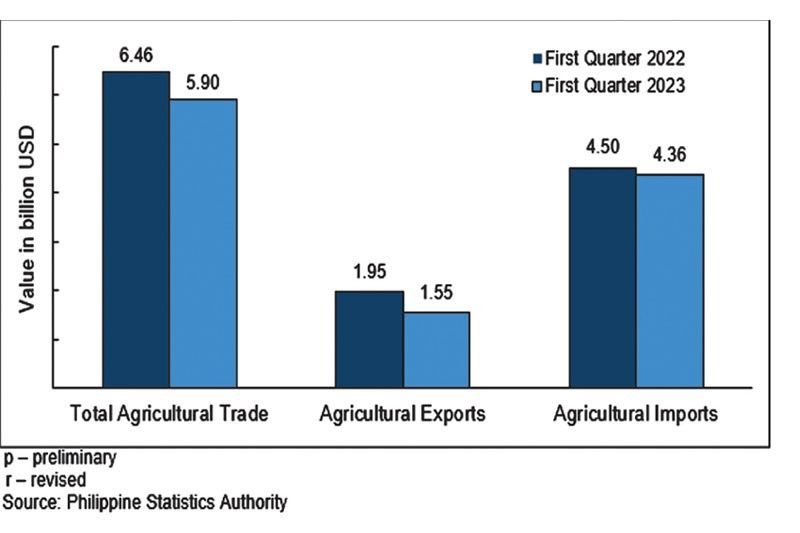Philippines: Agricultural trade drops by 8.6% in Q1
MANILA, Philippines — The Philippines saw a higher trade deficit even as the value of the country’s agricultural trade fell by 8.6 percent in the first quarter amid lower exports and imports, according to preliminary data from the Philippine Statistics Authority (PSA).
The country’s total agricultural trade reached $5.9 billion in the January to March period this year, down from $6.46 billion in the same period last year.
The first quarter figure compares with the 5.1 percent rise of agricultural trade in the previous quarter and the 30.7 percent growth a year ago.
Agricultural imports accounted for 73.8 percent of total agricultural trade during the quarter, down 3.3 percent to $4.36 billion.
The value of agricultural imports represented a share of 13.9 percent in the country’s total imports.
In contrast, agricultural exports accounted for 26.2 percent of the total trade, recording a 20.8 percent drop to $1.55 billion.
The PSA said the value of agricultural exports accounted for 9.2 percent of the country’s total exports.
The first quarter figures led to a trade deficit of -$2.81 billion, which went up by 10.2 percent from last year’s $2.55 billion.
The country’s top exports of agricultural commodities include edible fruits and nuts; animal or vegetable oils; preparation of vegetables, fruits and nuts; tobacco and manufactured tobacco substitutes; and preparation of meat, fish, crustaceans and others.
“Philippine agricultural exports consist mainly of coconut and banana products plus shrimp and tuna. These three subsectors faced challenges to production for the fourth quarter of 2022 and first quarter of 2023, which could have resulted in softer exports overall,” ING Bank senior economist Nicholas Mapa said in a text message.
On the other hand, the major import commodities were cereals, residues and waste from the food industries, miscellaneous edible preparations, animal or vegetable fats and oils and their cleavage products, and meat and edible meat offal.
Among ASEAN-member countries, Malaysia was still the top destination of exports with a 31.8 percent share valued at $52.58 million, while Indonesia was the top supplier of agricultural products accounting for $412.51 million or a 28 percent share.
Meanwhile, Netherlands remained as the country’s top destination of agricultural exports among European Union member countries, with a value of $180.77 million or a 47.5 percent share.
In contrast, Spain was the country’s top source of agricultural imports in the EU, with total imports reaching $93.93 million or 22.8 percent of the total imports from EU countries.
Source: https://www.philstar.com/business/2023/06/15/2273882/agricultural-trade-drops-86-q1


 English
English




